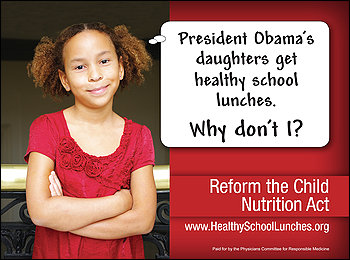Here's the poster:

According to The Washington Post, "the White House asked the Physicians Committee for Responsible Medicine to take down the ads, which feature Jasmine Messiah, a vegetarian who attends a Miami-Dade County public school that, she says, offers no vegetarian or vegan lunch options." According to the president of the Physicians Committee, the White House Counsel's office "made it clear that they viewed this as something that could lead to legal action if I wasn't responsive. But that was an implication."
It's hard to evaluate the White House Counsel's office statements based on such a paraphrase, but if they did suggest that the reference to the President's daughters was legally actionable, they were wrong. The so-called "right of publicity" may go further than I'd like, but even it doesn't go that far, especially in the context of a noncommercial poster that references someone in the course of making a political point.
Such speech is protected by the First Amendment, and in any event not an infringement of the right of publicity in the first place. See, e.g., Vassiliades v. Garfinckel's, Brooks Bros., 492 A.2d 580, 592 (D.D.C. 1985); Berkos v. NBC, Inc., 515 N.E.2d 668 (Ill. Ct. App. 1987); 765 Ill. Comp. Stat. 1075/1 et seq.. That the names aren't used is not itself dispositive, but the noncommercial nature and the fact that it involves something more than just selling a copy of someone's name or likeness should be dispositive.)
Of course, if the people from the Counsel's office simply relayed a request on behalf of the President, asking the Committee to do what they argued was the morally right thing and not really threatening legal action, that's a different story. I'm not sure why that should come, though, from the Counsel's office; but maybe the Counsel's office has historically had a broad mandate in such matters.
Still, even if the claim is that the Committee is doing something unethical or in bad taste, I don't see how that would be so. They aren't saying anything offensive or demeaning about the girls. They aren't faulting the girls for anything they've done. They're not, I think, putting them in a position where they might be deeply embarrassed if they see the ad, or if a friend asks them about it.
In fact, the ad isn't about anything the girls did — it's about what their relatively well-to-do parents are able to provide them, and what the Committee says the government should provide to all children (a position, incidentally, that I don't share on the merits). I don't see anything tasteless or ethically improper in commenting on public affairs, and in part on the options that the President has, by mentioning in this way the privileges that the President's children enjoy.